高中英语介词讲义
- 格式:pdf
- 大小:280.72 KB
- 文档页数:23
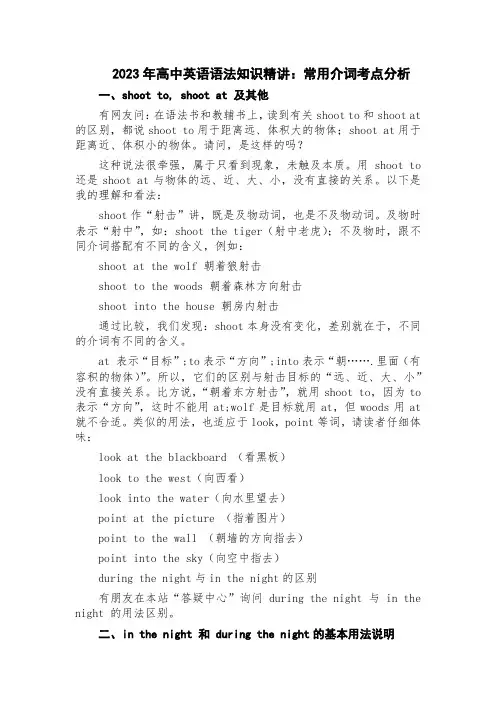
2023年高中英语语法知识精讲:常用介词考点分析一、shoot to, shoot at 及其他有网友问:在语法书和教辅书上,读到有关shoot to和shoot at 的区别,都说shoot to用于距离远、体积大的物体;shoot at用于距离近、体积小的物体。
请问,是这样的吗?这种说法很牵强,属于只看到现象,未触及本质。
用shoot to 还是shoot at与物体的远、近、大、小,没有直接的关系。
以下是我的理解和看法:shoot作“射击”讲,既是及物动词,也是不及物动词。
及物时表示“射中”,如:shoot the tiger(射中老虎);不及物时,跟不同介词搭配有不同的含义,例如:shoot at the wolf 朝着狼射击shoot to the woods 朝着森林方向射击shoot into the house 朝房内射击通过比较,我们发现:shoot本身没有变化,差别就在于,不同的介词有不同的含义。
at 表示“目标”;to表示“方向”;into表示“朝…….里面(有容积的物体)”。
所以,它们的区别与射击目标的“远、近、大、小”没有直接关系。
比方说,“朝着东方射击”,就用shoot to,因为to 表示“方向”,这时不能用at;wolf是目标就用at,但woods用at 就不合适。
类似的用法,也适应于look,point等词,请读者仔细体味:look at the blackboard (看黑板)look to the west(向西看)look into the water(向水里望去)point at the picture (指着图片)point to the wall (朝墙的方向指去)point into the sky(向空中指去)during the night与in the night的区别有朋友在本站“答疑中心”询问 during the night 与 in the night 的用法区别。
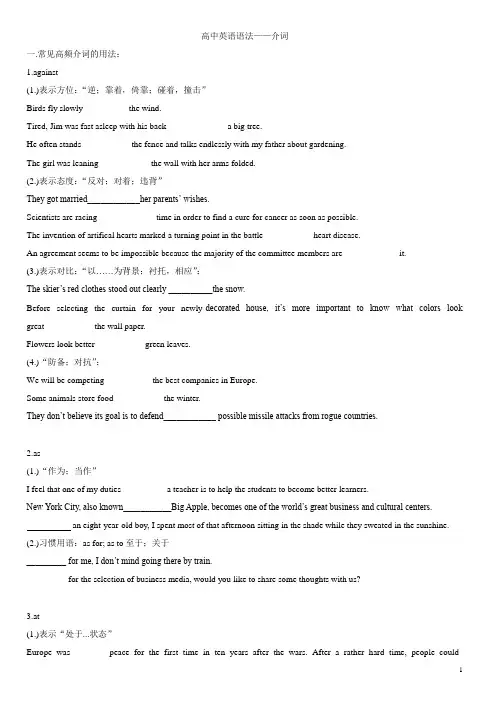
高中英语语法——介词一.常见高频介词的用法:1.against(1.)表示方位:“逆;靠着,倚靠;碰着,撞击”Birds fly slowly__________ the wind.Tired, Jim was fast asleep with his back _____________ a big tree.He often stands___________ the fence and talks endlessly with my father about gardening.The girl was leaning ___________ the wall with her arms folded.(2.)表示态度:“反对;对着;违背”They got married____________her parents’ wishes.Scientists are racing_____________ time in order to find a cure for cancer as soon as possible.The invention of artifical hearts marked a turning point in the battle___________ heart disease.An agreement seems to be impossible because the majority of the committee members are ____________ it.(3.)表示对比:“以……为背景;衬托,相应”:The skier’s red clothes stood out clearly __________the snow.Before selecting the curtain for your newly-decorated house, it’s more important to know what colors look great___________ the wall paper.Flowers look better___________ green leaves.(4.)“防备;对抗”:We will be competing __________ the best companies in Europe.Some animals store food___________ the winter.They don’t believe its goal is to defend____________ possible missile attacks from rogue countries.2.as(1.)“作为;当作”I feel that one of my duties__________ a teacher is to help the students to become better learners.New York City, also known___________Big Apple, becomes one of the world’s great business and cultural centers.__________ an eight-year-old boy, I spent most of that afternoon sitting in the shade while they sweated in the sunshine. (2.)习惯用语:as for; as to至于;关于_________ for me, I don’t mind going there by train._________ for the selection of business media, would you like to share some thoughts with us?3.at(1.)表示“处于...状态”Europe was_________peace for the first time in ten years after the wars. After a rather hard time, people couldlive________ at last. (注意:in peace“平静地、安静地”=peacefully; at peace处于和平状态)The two countries are _________ war.(2.)表示“在...时刻、钟点、岁”Children begin schooling___________ the age of five.The two brothers decided to leave _________ midnight, for they had many miles to cover.The advertisement said that a suitable house in a quiet area was up for sale___________ a reasonable price(3.)表示速度、价格、比率:“以...”The population of the world is growing_________ a surprising rate.Gary must have driven_________ the speed of 80 miles an hour just now, for which he was given a ticket by a policeman.(4.)表示目标、方向:“对、向、朝”,这类动词有:laugh, come, aim, pointHe aimed_______ the target.I stared __________everything as if I were looking for the first time.My uncles immediately jumped up and shot their arrows ________ the bird.(5.)表示“应...请求、号召、邀请”We came to Beijing_________ the invitation of my good friend who has been woeking here for three years.(6.)习惯用语:“at+名词短语”:表示“一...就...”at the sight of...一看见...就... at the sound of...一听到...就... at the thought/ ideaof...一想起...就... at the news of ...一得到...的消息,就...The girl cried _________ the sight of her mother.The terrible king’s wish was that all the people would shake in fear_________ the sound of his order.People in love with each other may feel empty and sick___________ the thought of not being together.4.beyond(1.)表示程度:“超出,非……所能及”To be acknowledged as the first to receive this honor is_____________ expression in words for me.You really nee d to pay a visit to Shanghai since you haven’t been there for years, and you will find changes there are_____________ imagination.We must read not only between the lines, but sometimes__________ the lines so that we can fully understand the writer. (2.)表示时间:“过了,比...晚,迟于……”He delayed the matter ________ the fixed time.He came home__________ the usual time.(3.)表示位置:“在……另一边,在……更远处”The woods go for about two miles ___________ the river. 这片森林伸展到河那边大约两英里。
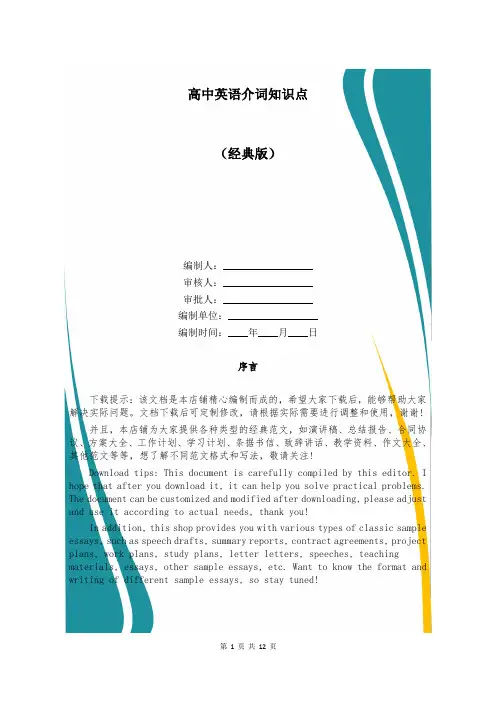
高中英语介词知识点(经典版)编制人:__________________审核人:__________________审批人:__________________编制单位:__________________编制时间:____年____月____日序言下载提示:该文档是本店铺精心编制而成的,希望大家下载后,能够帮助大家解决实际问题。
文档下载后可定制修改,请根据实际需要进行调整和使用,谢谢!并且,本店铺为大家提供各种类型的经典范文,如演讲稿、总结报告、合同协议、方案大全、工作计划、学习计划、条据书信、致辞讲话、教学资料、作文大全、其他范文等等,想了解不同范文格式和写法,敬请关注!Download tips: This document is carefully compiled by this editor. I hope that after you download it, it can help you solve practical problems. The document can be customized and modified after downloading, please adjust and use it according to actual needs, thank you!In addition, this shop provides you with various types of classic sample essays, such as speech drafts, summary reports, contract agreements, project plans, work plans, study plans, letter letters, speeches, teaching materials, essays, other sample essays, etc. Want to know the format and writing of different sample essays, so stay tuned!高中英语介词知识点介词的英语全称为“preposition”是由“前缀pre-(在……前部)+position(位置)”构成的,所以又叫前置词。
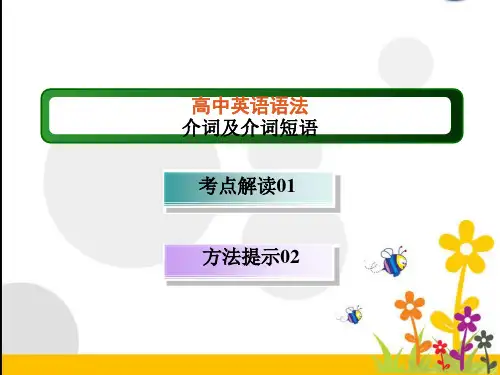
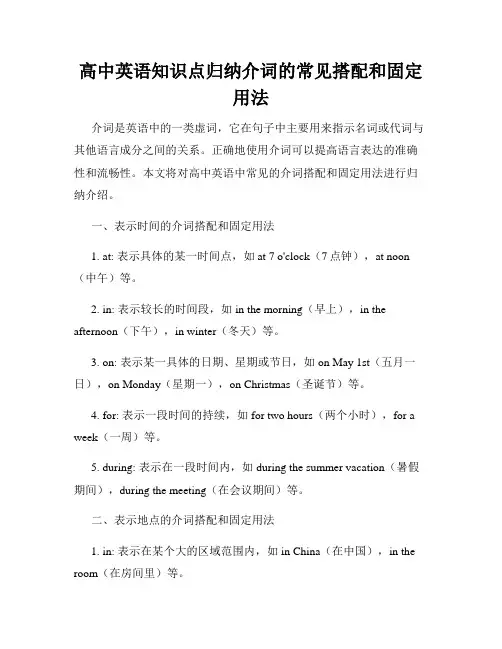
高中英语知识点归纳介词的常见搭配和固定用法介词是英语中的一类虚词,它在句子中主要用来指示名词或代词与其他语言成分之间的关系。
正确地使用介词可以提高语言表达的准确性和流畅性。
本文将对高中英语中常见的介词搭配和固定用法进行归纳介绍。
一、表示时间的介词搭配和固定用法1. at: 表示具体的某一时间点,如at 7 o'clock(7点钟),at noon (中午)等。
2. in: 表示较长的时间段,如in the morning(早上),in the afternoon(下午),in winter(冬天)等。
3. on: 表示某一具体的日期、星期或节日,如on May 1st(五月一日),on Monday(星期一),on Christmas(圣诞节)等。
4. for: 表示一段时间的持续,如for two hours(两个小时),for a week(一周)等。
5. during: 表示在一段时间内,如during the summer vacation(暑假期间),during the meeting(在会议期间)等。
二、表示地点的介词搭配和固定用法1. in: 表示在某个大的区域范围内,如in China(在中国),in the room(在房间里)等。
2. on: 表示在某个较小的平面或曲面上,如on the table(在桌子上),on the ground(在地上)等。
3. at: 表示在某个具体的点上,如at the bus stop(在公交车站),at the cinema(在电影院)等。
4. to: 表示朝向某个地点或方向,如go to school(去学校),look to the future(展望未来)等。
三、表示原因和目的的介词搭配和固定用法1. because of: 表示因为某个原因,如because of the rain(因为下雨),because of his hard work(因为他的努力)等。
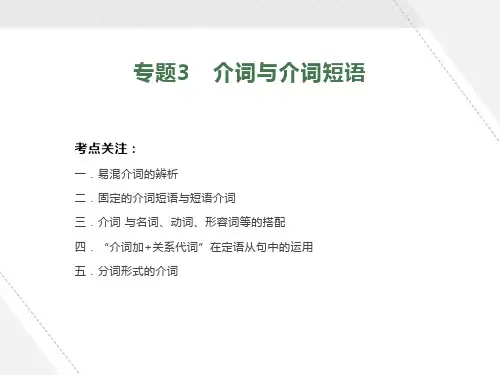
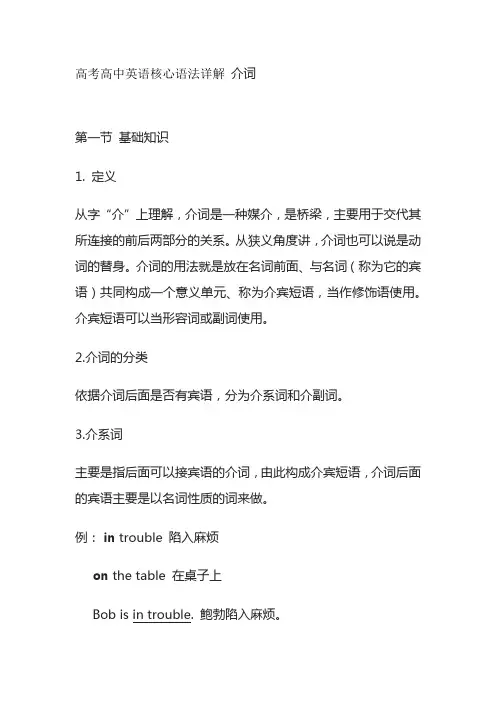
高考高中英语核心语法详解介词第一节基础知识1. 定义从字“介”上理解,介词是一种媒介,是桥梁,主要用于交代其所连接的前后两部分的关系。
从狭义角度讲,介词也可以说是动词的替身。
介词的用法就是放在名词前面、与名词(称为它的宾语)共同构成一个意义单元、称为介宾短语,当作修饰语使用。
介宾短语可以当形容词或副词使用。
2.介词的分类依据介词后面是否有宾语,分为介系词和介副词。
3.介系词主要是指后面可以接宾语的介词,由此构成介宾短语,介词后面的宾语主要是以名词性质的词来做。
例:in trouble 陷入麻烦on the table 在桌子上Bob is in trouble. 鲍勃陷入麻烦。
A red apple is on the table. 一个红苹果放在桌子上了。
4.介副词后面没有宾语,而是直接当副词使用。
Come in. 进来!The soldier stood up. 那名士兵站起来了。
5. 介副词和介词共同使用Mary went down to the basement. 玛丽去了地下室。
down 是介副词,后面没有宾语、直接修饰动词went;to 是介系词,后接名词词组the basement 当宾语、构成一个介词词组to the basement;went 看作不及物动词,后接介词to,再加宾语the basement;He has gone over to your office.over 是介副词,直接修饰动词has gone;to 是介词,后接名词词组your office 当宾语,构成一个介词词组to your office;gone看作不及物动词,后接介词to,再加宾语your office;第二节介系词在短语层面的应用介系词加宾语构成介宾短语后,主要出现在后修饰位置,其作用是交代中心词与其后的宾语之间的关系。
此时介宾短语也可视为形容词的性质。
例:a.2000 entry into the World Trade Organization2000年加入世贸b.an important earner of foreign exchange 赚取外汇的重要来源c. a boom in exports 出口增长第三节介系词在句子层面的应用1. 前状/后状:With the warm weather, the trees grow very well. 天气暖和,树木生长的很好!Kill two birds with one stone. 一石二鸟/一举两得。
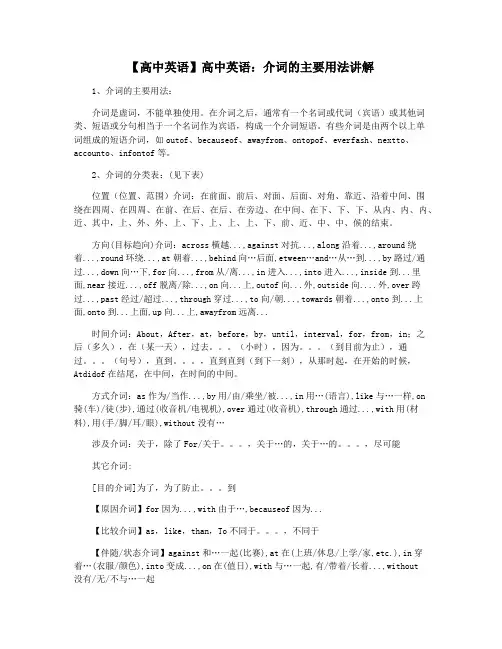
【高中英语】高中英语:介词的主要用法讲解1、介词的主要用法:介词是虚词,不能单独使用。
在介词之后,通常有一个名词或代词(宾语)或其他词类、短语或分句相当于一个名词作为宾语,构成一个介词短语。
有些介词是由两个以上单词组成的短语介词,如outof、becauseof、awayfrom、ontopof、everfash、nextto、accounto、infontof等。
2、介词的分类表:(见下表)位置(位置、范围)介词:在前面、前后、对面、后面、对角、靠近、沿着中间、围绕在四周、在四周、在前、在后、在后、在旁边、在中间、在下、下、下、从内、内、内、近、其中,上、外、外、上、下、上、上、上、下、前、近、中、中、候的结束。
方向(目标趋向)介词:across横越...,against对抗...,along沿着...,around绕着...,round环绕...,at朝着...,behind向…后面,etween…and…从…到...,by路过/通过...,down向…下,for向...,from从/离...,in进入...,into进入...,inside到...里面,near接近...,off脱离/除...,on向...上,outof向...外,outside向....外,over跨过...,past经过/超过...,through穿过...,to向/朝...,towards朝着...,onto到...上面,onto到...上面,up向...上,awayfrom远离...时间介词:About,After,at,before,by,until,interval,for,from,in;之后(多久),在(某一天),过去。
(小时),因为。
(到目前为止),通过。
(句号),直到。
,直到直到(到下一刻),从那时起,在开始的时候,Atdidof在结尾,在中间,在时间的中间。
方式介词:as作为/当作...,by用/由/乘坐/被...,in用…(语言),like与…一样,on骑(车)/徒(步),通过(收音机/电视机),over通过(收音机),through通过...,with用(材料),用(手/脚/耳/眼),without没有…涉及介词:关于,除了For/关于。

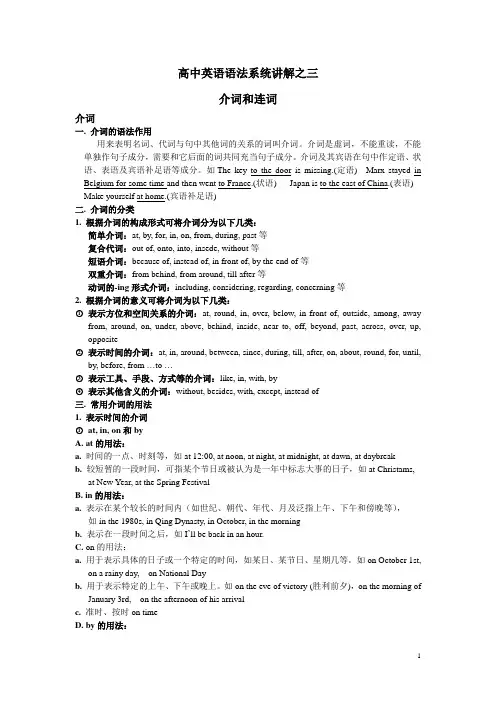
高中英语语法系统讲解之三介词和连词介词一. 介词的语法作用用来表明名词、代词与句中其他词的关系的词叫介词。
介词是虚词,不能重读,不能单独作句子成分,需要和它后面的词共同充当句子成分。
介词及其宾语在句中作定语、状语、表语及宾语补足语等成分。
如The key to the door is missing.(定语) Marx stayed in Belgium for some time and then went to France.(状语) Japan is to the east of China.(表语) Make yourself at home.(宾语补足语)二. 介词的分类1. 根据介词的构成形式可将介词分为以下几类:简单介词:at, by, for, in, on, from, during, past等复合代词:out of, onto, into, insede, without等短语介词:because of, instead of, in front of, by the end of等双重介词:from behind, from around, till after等动词的-ing形式介词:including, considering, regarding, concerning等2. 根据介词的意义可将介词为以下几类:○1表示方位和空间关系的介词:at, round, in, over, below, in front of, outside, among, away from, around, on, under, above, behind, inside, near to, off, beyond, past, across, over, up, opposite○2表示时间的介词:at, in, around, between, since, during, till, after, on, about, round, for, until, by, before, from …to …○3表示工具、手段、方式等的介词:like, in, with, by○4表示其他含义的介词:without, besides, with, except, instead of三. 常用介词的用法1. 表示时间的介词○1at, in, on和byA. at的用法:a.时间的一点、时刻等,如at 12:00, at noon, at night, at midnight, at dawn, at daybreakb. 较短暂的一段时间,可指某个节日或被认为是一年中标志大事的日子,如at Christams,at New Year, at the Spring FestivalB. in的用法:a. 表示在某个较长的时间内(如世纪、朝代、年代、月及泛指上午、下午和傍晚等),如in the 1980s, in Qing Dynasty, in October, in the morningb.表示在一段时间之后,如I’ll be back in an hour.C. on的用法:a.用于表示具体的日子或一个特定的时间,如某日、某节日、星期几等。

高中英语语法归纳总结介词在高中英语学习中,介词(Preposition)是一个重要的语法知识点。
介词通常用于连接名词、代词、动词或其他词与句子其他成分,起到表示时间、地点、方向、原因、目的等各种关系的作用。
本文将对高中英语语法中常用的介词进行归纳总结,帮助同学们更好地掌握和运用介词。
一、介词的基本概念和分类1. 介词的定义:介词是一类虚词,常由一个或多个字母构成,放在名词、代词或动词等前面,用以表示各种关系,如时间、地点、原因、目的等。
2. 介词的分类:- 时间介词:at, on, in, during, for等。
- 地点介词:in, on, at, by, under等。
- 方向介词:to, from, into, out of, up等。
- 方式介词:with, by, in, without等。
- 原因介词:because of, due to, thanks to等。
- 目的介词:for, to, in order to, so as to等。
二、常用介词用法总结1. 时间介词:- at:用于表示具体的点、时刻或某一天的准确时间,如at 7 o'clock, at noon, at Christmas等。
- in:用于表示较长的时间段、月份、季节、年份等,如in the morning, in May, in winter, in 2022等。
- on:用于表示某一天、日期或具体的星期几,如on Monday, on January 1st, on the weekend等。
- during:用于表示整个时间段或某一时期,如during the summer, during the meeting等。
- for:表示持续的时间段,如for two hours, for a week等。
2. 地点介词:- in:用于表示较大的范围、国家、城市、地区等,如in China, in Beijing, in the classroom等。
介词介词是用于名词或代词之前、表示词与词之间关系的词类。
介词常与动词、形容词和名词搭配表示不同的意义。
表示时间关系的介词1. 表示时间段的介词(1) in, after“in+时间段”的名词词组表示从现在起往后推算一段时间,“after+时间段”表示从过去某时间往后推算一段时间。
例如:He'll return in three days/in three days' time.他三天后回来。
He left on Sunday and returned after three days.他星期日动身,三天后回来。
(2) in, within,duringin表示一段时间之内,within强调不能超过某段时间。
表示在一段特指的时间内,可用in或during,名词前通常有冠词、物主代词等限定词。
例如:The work was done in/within a week.这工作一周内就完成了。
The work was done during/in the holidays.这工作是假期里完成的。
表示年份、月份、季节用介词in。
例如:in 1990, in July, in summer。
in(3)during the(last+时间段for pastover表示在最近一段时间内,句中谓语动词通常用现在完成时。
She has been in London in the last few years.她最近几年一直在伦敦。
(4) for,overfor表示延续一段时间。
over表示贯穿一段时间。
例如:I'll study in the college for two years.我将在大学学习两年。
I hope they will stay over Christmas.我希望他们能过完圣诞。
2. 表示某一时间的介词(1) at, onat表示某一时刻,on表示某一天或日期。
例如:Shall we meet at 6:30?我们六点半见面好吗?The meeting will continue on Monday, April 1.会议四月一日,星期一继续进行。
高中英语语法讲解 四、介词和介词短语 ① 方位介词②时间介词at, in, onin, afterin 表示时间,常表示“在...之内”,有时“在...之后”,但此意时必须与将来时连用,后面必须是一段时间。
否则用after,later. eg. My father will be back in three days.after 意为“在...之后”。
通常“after+时间段”与过去时连用。
如:Myfather will be back after 3 o ’clock.My father came back after 3days/ 3 days later.for, from, since①among 和between among 表示在三者或以上之间,而between 表示在两者之间。
有时between 之后出现三者或三者以上的宾语,这时仍强调每两者之间的相互关系。
There is something shinning between trees.在树中间有东西闪闪发亮。
② in 和on 若打击某人的脸、眼、嘴、胸、腹等部位时,用in,而打击头、额、鼻、耳、颈、肩、腿等部位时,用on.树上长出来的东西用on,树以外的人或动物在树上,用in,指被树叶遮掩其中。
③across 和through across 指从物体表面穿过 through 指从物体内部穿过He walked across the fields. He ran through the town. at 表示时间的一点,如at 12:00,at noon,at night, at midnight.表示较短暂的一段时间,可指某节日或被认为是一年中标志大事的日子。
如at Chrismas, at the beginning of March 。
in 在某个较长的时间内,如:in the 1980s, in the Qing Dynasty. on 用于表示具体的日子或一个特定的时间,如on October the first;用于表示特定的上午,下午或晚上,如:on the eve of victory,on the afternoon of his arrival 等;准时,按时: on time.for后接段时间,表示行为或状态持续了多久;from后接时间点,表示行为或状态的起始点,而不涉及其持续时间的长短;since后接时间点,不仅表示行为或状态的起始点,而且还强调该行为或状态从起始点一直持续到说话的时刻,因而常与延续性动词的现在完成时连用。
高中英语语法——介词一.常见高频介词的用法:1.against(1.)表示方位:“逆;靠着,倚靠;碰着,撞击”Birds fly slowly__________ the wind.Tired, Jim was fast asleep with his back _____________ a big tree.He often stands___________ the fence and talks endlessly with my father about gardening.The girl was leaning ___________ the wall with her arms folded.(2.)表示态度:“反对;对着;违背”They got married____________her parents’ wishes.Scientists are racing_____________ time in order to find a cure forcancer as soon as possible.The invention of artifical hearts marked a turning point in thebattle___________ heart disease.An agreement seems to be impossible because the majority of thecommittee members are ____________ it.(3.)表示对比:“以……为背景;衬托,相应”:The skier’s red clothes stood out clearly __________the snow.Before selecting the curtain for your newly-decorated house, it’s more important to know what colors look great___________ the wall paper. Flowers look better___________ green leaves.(4.)“防备;对抗”:We will be competing __________ the best companies in Europe.Some animals store food___________ the winter.They don’t believe its goal is to defend____________ possible missile attacks from rogue countries.2.as(1.)“作为;当作”I feel that one of my duties__________ a teacher is to help the students to become better learners.New York City, also known___________Big Apple, becomes one of theworld’s great business and cultural centers.__________ an eighty earo ld boy, I spent most of that afternoon sitting in the shade while they sweated in the sunshine.(2.)习惯用语:as for; as to至于;关于_________ for me, I don’t mind going there by train._________ for the selection of business media, would you like to share some thoughts with us?3.at(1.)表示“处于...状态”Europe was_________peace for the first time in ten years after the wars. After a rather hard time, people could live________ at last. (注意:in peace“平静地、安静地”=peacefully; at peace处于和平状态)The two countries are _________ war.(2.)表示“在...时刻、钟点、岁”Children begin schooling___________ the age of five.The two brothers decided to leave _________ midnight, for they had many miles to cover.The advertisement said that a suitable house in a quiet area was up for sale___________ a reasonable price(3.)表示速度、价格、比率:“以...”The population of the world is growing_________ a surprising rate.Gary must have driven_________ the speed of 80 miles an hour just now, for which he was given a ticket by a policeman.(4.)表示目标、方向:“对、向、朝”,这类动词有:laugh, come, aim, point He aimed_______ the target.I stared __________everything as if I were looking for the first time.My uncles immediately jumped up and shot their arrows ________ the bird.(5.)表示“应...请求、号召、邀请”We came to Beijing_________ the invitation of my good friend who has been woeking here for three years.(6.)习惯用语:“at+名词短语”:表示“一...就...”at the sight of...一看见...就... at the sound of...一听到...就... atthe thought/ ideaof...一想起...就...at the news of ...一得到...的消息,就...The girl cried _________ the sight of her mother.The terrible king’s wish was that all the people would shake in fear_________ the sound of his order.People in love with each other may feel empty and sick___________ the thought of not being together.4.beyond(1.)表示程度:“超出,非……所能及”To be acknowledged as the first to receive this honor is_____________ expression in words for me.You really need to pay a visit to Shanghai since you haven’t been there for years, and you will find changes there are_____________ imagination.We must read not only between the lines, but sometimes__________ the lines so that we can fully understand the writer.(2.)表示时间:“过了,比...晚,迟于……”He delayed the matter ________ the fixed time.He came home__________ the usual time.(3.)表示位置:“在……另一边,在……更远处”The woods go for about two miles ___________ the river. 这片森林伸展到河那边大约两英里。
The small villiage is 20 miles_________ the town. 那个小村庄在离城20英里以外的地方。
5.by(1.)表示方法、手段:“靠、用、通过”You can reserve tickets __________ phone. 你可以通过电话订票。
He makes a living_________ selling newspapers.This kind of work is done_______hand/machine. 这种工作是手工/机器做的。
——What do you mean __________saying “the boy is overgrowing?”——I mean that he is tall_______ his age.(2.)表示标准、度量、数量:根据,按照,以……计算,常用结构“by+the+计量名词或by+un.(weight/length/width/depth/volume)”Parcel post is charged _________ weight and mileage, without reference to contents.包裹邮递按重量和路程收费,不管所装何物。
Meat is sold________ the pound. They are paid_________ the hour.(3.)“经过、经由”If you really have to leave during the meeting, you’d better leave___________ the back door.He walked right _________ me without even saying hello.他径直从我身边走过,甚至连招呼都不打。